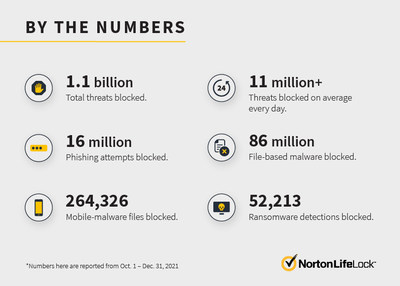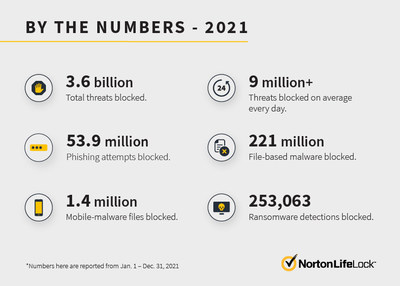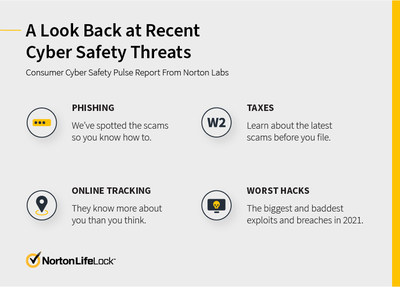Norton Consumer Cyber Safety Pulse Report Reveals Online Tracking is More Rampant Than Most Realize
NortonLifeLock's global research team, Norton Labs, released its Consumer Cyber Safety Pulse Report, highlighting significant findings on online tracking and scams from October to December 2021. The report reveals that many tracking organizations can access up to 80% of a user’s browsing history, with a majority of trackers encountered within the first two hours of online activity. In 2021, Norton thwarted 3.6 billion threats, including 1.1 billion in Q4 alone. The report also warns of upcoming tax season scams exploiting urgency around tax credits.
- Thwarted 3.6 billion total threats in 2021, averaging nearly 10 million daily.
- Blocked 53.9 million phishing attempts and 253,063 ransomware attacks.
- High prevalence of online trackers compromising user privacy.
- Emerging scams tied to urgent tax season communications.
TEMPE, Ariz., Jan. 25, 2022 /PRNewswire/ -- NortonLifeLock's global research team, Norton Labs, today published its fourth quarterly Consumer Cyber Safety Pulse Report, detailing the top consumer cybersecurity insights and takeaways from October through December 2021. Leveraging the company's global threat telemetry, the analysis includes new findings on the omnipresence of online trackers and the top scams dominating the final quarter.
Norton Labs found that consumers are tracked as soon as they go online by many different organizations, and the trackers collect significantly more of our digital lives than previously reported, including sensitive information about individuals. Notably, Norton found that half of the tracking organizations encountered in one week come through within the first two hours of browsing – suggesting that even if users were to clear their browsing history every day, it would only take an average of two hours to re-encounter half of all online trackers.
"While it's common knowledge that web trackers follow us around the internet, our privacy researchers were surprised to find that some online trackers know up to
This quarter, Norton also found scams tied to Covid-19 and pop-culture moments among all the other usual suspects. Cybercriminals continued to exploit the pandemic with Covid-19 scams that capitalized off the ever-evolving situation. Moreover, they continued to leverage interest in popular shows like "Squid Game," with phishing scams disguised as giveaways.
By the Numbers
In 2021, Norton thwarted 3.6 billion threats, or nearly 10 million threats per day, including 1.1 billion threats between October and December. Norton blocked:
- 53.9 million phishing attempts
- 221.09 million file threats
- 1.4 million mobile threats
- 253,063 ransomware attacks
Looking Ahead
Consumers will again see a surge in tax season scams. Like clockwork, cybercriminals have begun to exploit the upcoming tax season, with new scams creating a false sense of urgency with an email or text message informing victims that they have a limited time to claim child tax credits. Victims have been led to spoofed IRS phishing pages that then collect their username, password and social security number, among other personal information.
For more information and Cyber Safety guidance, visit the Norton Internet Security Center.
About NortonLifeLock Inc.
NortonLifeLock Inc. (NASDAQ: NLOK) is a global leader in consumer Cyber Safety, protecting and empowering people to live their digital lives safely. We are the consumer's trusted ally in an increasingly complex and connected world. Learn more about how we're transforming Cyber Safety at www.NortonLifeLock.com.
Jenna Torluemke | Heaven Lampshire |
NortonLifeLock Inc. | Edelman for NortonLifeLock Inc. |
![]() View original content to download multimedia:https://www.prnewswire.com/news-releases/norton-consumer-cyber-safety-pulse-report-reveals-online-tracking-is-more-rampant-than-most-realize-301467132.html
View original content to download multimedia:https://www.prnewswire.com/news-releases/norton-consumer-cyber-safety-pulse-report-reveals-online-tracking-is-more-rampant-than-most-realize-301467132.html
SOURCE NortonLifeLock Inc.
FAQ
What were the key findings of NortonLifeLock's Q4 Consumer Cyber Safety Pulse Report?
How many threats did NortonLifeLock block in 2021?
What types of scams are highlighted in the NortonLifeLock report?
What is the significance of online trackers as discussed in the report?











